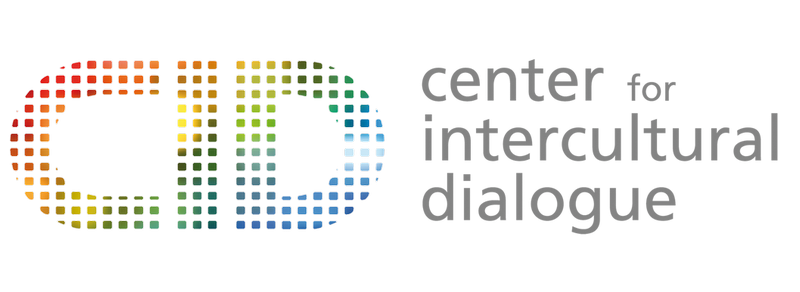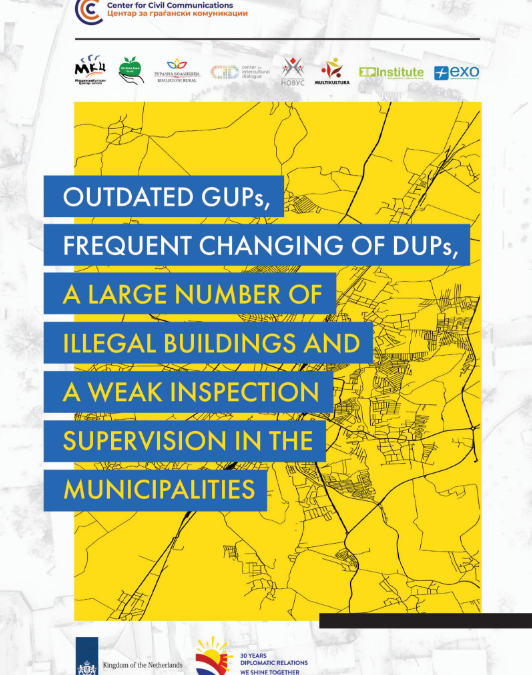On February 29, 2024, a significant investigation titled “Outdated General Urban Plans, Frequent Changes in Detailed Urban Plans, and a High Number of Illegal Constructions” was released (below you can find the investigations), shedding light on a pressing issue affecting many municipalities across North Macedonia. This comprehensive study reveals that a majority of these municipalities are operating with General Urban Plans (GUPs) that have formally expired, leading to unplanned management of construction land and jeopardizing public interest and quality of life.
The investigation, carried out by the Center for Civic Communications in collaboration with various non-governmental organizations involved in the “Protection from Corruption” project, focused on eight targeted municipalities: Bitola, Kichevo, Kumanovo, Negotino, Tetovo, Strumica, Chair, and Štip. Funded by the Embassy of the Kingdom of the Netherlands in Skopje, the study highlights several key findings that underscore the challenges and potential risks posed by the current urban planning and construction practices.
Key Findings:
- Outdated GUPs: Despite the legally prescribed planning period of 10 years, in some municipalities, GUPs have not been updated for over 20 years. This delay in renewing and drafting new GUPs creates a risk of unplanned management of construction land, threatening the public interest and the quality of life.
- Frequent Changes in Detailed Urban Plans (DUPs): Remarkably, three-quarters of the amendments to DUPs were made at the request of individuals or legal entities. This practice suggests that planning documentation is often changed and adapted according to the needs of external subjects, rather than municipal initiatives aimed at enhancing public spaces.
- Rejected or Withdrawn Construction Permits: One in every three construction permit applications between 2018 and 2022 was either rejected or withdrawn. This indicates that the procedures for issuing construction permits can be unjustly prolonged or lack uniform treatment of applicants in certain cases.
- Requests for Legalization of Illegal Constructions: The number of requests for the legalization of illegally built structures submitted in 2018 was more than double the number of construction permit applications over five years, from 2018 to 2022. This clearly illustrates the consequences of adopting laws for establishing the legal status of unlawfully constructed objects, which compromise the principles of rule of law and planned spatial development.
- Inefficient Inspection Oversight: The high number of illegal constructions also points to the inefficiency of inspection oversight. Instead of being demolished, these structures await legalization, significantly outnumbering the legal construction applications.
- Staffing Issues in Urban Planning Units: On average, only 62% of positions in urban planning organizational units are filled, and in half of the municipalities, there is no appointed head of the urban planning unit. This situation implies that comprehensive and efficient control is not established, increasing the possibility of mayors exerting greater influence by appointing close associates to key positions.
This investigation was supported by the Youth Cultural Center – Bitola, Rural Coalition, Center for Intercultural Dialogue, Ecological Society ‘Vila Zora’ Veles, Association of Citizens Center for Research and Analysis NOVUS Strumica, Association Multikultura, Association of Citizens ZIP Institute for Policies and Good Governance, and EHO Educational-Humanitarian Organization. It forms part of the “Protection from Corruption” project, implemented with financial assistance from the Embassy of the Kingdom of the Netherlands in Skopje, spanning from November 1, 2021, to October 31, 2024.
For more information, please contact us. This study highlights the urgent need for reform in urban planning and construction management in North Macedonia, aiming to ensure sustainable development and protect the interests of its citizens.




